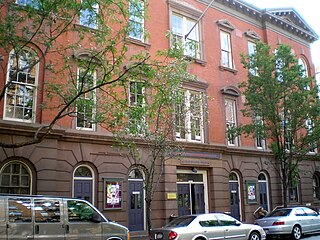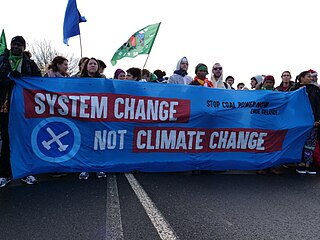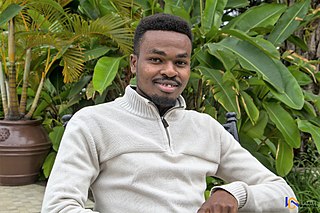Related Research Articles

Youth activism is the participation in community organizing for social change by persons between the ages of 15–24. Youth activism has led to a shift in political participation and activism. A notable shift within youth activism is the rise of “Alter-Activism” resulting in an emphasis on lived experiences and connectivity amongst young activists. The young activists have taken lead roles in public protest and advocacy around many issues like climate change, abortion rights and gun violence. Different from past protest or advocacy, technology has become the backbone to many of these modern youth movements. It has been shown in multiple studies that internet use along with seeking information online is shown to have positive impacts on political engagement. Popular applications like Twitter, Instagram and YouTube have become the newest tools for young activist in the 21st century. Technology and the use of digital media has changed the way youth participate in activism globally, and youth are more active in media than older generations.

Youth empowerment is a process where children and young people are encouraged to take charge of their lives. They do this by addressing their situation and then take action in order to improve their access to resources and transform their consciousness through their beliefs, values, and attitudes. Youth empowerment aims to improve quality of life. Youth empowerment is achieved through participation in youth empowerment programs. However scholars argue that children's rights implementation should go beyond learning about formal rights and procedures to give birth to a concrete experience of rights. There are numerous models that youth empowerment programs use that help youth achieve empowerment. A variety of youth empowerment initiatives are underway around the world. These programs can be through non-profit organizations, government organizations, schools or private organizations.
The origin of the LGBT student movement can be linked to other activist movements from the mid-20th century in the United States. The Civil Rights Movement and Second-wave feminist movement were working towards equal rights for other minority groups in the United States. Though the student movement began a few years before the Stonewall riots, the riots helped to spur the student movement to take more action in the US. Despite this, the overall view of these gay liberation student organizations received minimal attention from contemporary LGBT historians. This oversight stems from the idea that the organizations were founded with haste as a result of the riots. Others historians argue that this group gives too much credit to groups that disagree with some of the basic principles of activist LGBT organizations.

The Lesbian, Gay, Bisexual & Transgender Community Center, commonly called The Center, is a nonprofit organization serving the lesbian, gay, bisexual and transgender (LGBT) population of New York City and nearby communities.

The National Coalition Against Censorship (NCAC), founded in 1974, is an alliance of 50 American non-profit organizations, including literary, artistic, religious, educational, professional, labor, and civil liberties groups. NCAC is a New York-based organization with official 501(c)(3) status in the United States. The coalition works to defend freedom of thought, inquiry, and expression from censorship and threats of censorship through education and outreach, and direct advocacy. NCAC assists individuals, community groups, and institutions with strategies and resources for resisting censorship and creating a climate hospitable to free expression. It also encourages the publicizing of cases of censorship and has a place to report instances of censorship on the organization's website. Their annual fundraiser is called the Free Speech Defender Awards. The main goal of the organization is to defend the first amendment, freedom of thought, inquiry, and expression. NCAC's website contains reports of censorship incidents, analysis and discussion of free expression issues, a database of legal cases in the arts, an archive of NCAC's quarterly newsletter, a blog, and Censorpedia, a crowdsourced wiki. In fiscal year 2017, the organization earned a 95.93% rating by Charity Navigator, an organization that assesses the efficacy of nonprofits.
Wendy Schaetzel Lesko is co-founder of Youth Infusion as well as co-founder of the Youth Activism Project. Lesko is an author of several books on youth-led advocacy, especially in the public policy arena, and recognized nationally as an expert and intergenerational collaboration.

Education in Mali is considered a fundamental right of Malians. For most of Mali's history, the government split primary education into two cycles which allowed Malian students to take examinations to gain admission to secondary, tertiary, or higher education. Mali has recently seen large increases in school enrollment due to educational reforms.

The youth rights movement seeks to grant the rights to young people that are traditionally reserved for adults, due to having reached a specific age or sufficient maturity. This is closely akin to the notion of evolving capacities within the children's rights movement, but the youth rights movement differs from the children's rights movement in that the latter places emphasis on the welfare and protection of children through the actions and decisions of adults, while the youth rights movement seeks to grant youth the liberty to make their own decisions autonomously in the ways adults are permitted to, or to lower the legal minimum ages at which such rights are acquired, such as the age of majority and the voting age.
Advocates for Youth is a nonprofit organization and advocacy group based in Washington, D.C., United States, dedicated to sexuality education, the prevention of HIV and of sexually transmitted disease, teenage pregnancy prevention, youth access to condoms and contraception, equality for LGBT youth, and youth participation. In addition, Advocates for Youth sponsors media campaigns and other forms of outreach which attempt to change societal norms to be more understanding of, accepting, of, and responsible about youth sexuality.
The Freechild Institute for Youth Engagement is a nonprofit organization focused on creating connections between adults and young people through programs, technical assistance, publications, training, and curriculum. Adam Fletcher is the executive director, and the institute is located in Olympia, Washington. The School Library Journal has said Freechild's website is, "By far the largest repository of projects, ideas, and organizational links, this resource provides more than adequate information to help students brainstorm ideas in order to start their own initiatives."
Women Deliver is a global advocacy organization that works to generate political commitment and financial investment for fulfilling Millennium Development Goal 5—reducing maternal mortality and achieving universal access to reproductive health.

The National Center for Women & Information Technology (NCWIT) is a 501(c)(3) nonprofit organization that works to increase the meaningful participation of girls and women in computing. NCWIT was founded in 2004 by Lucinda (Lucy) Sanders, Dr. Telle Whitney, and Dr. Robert (Bobby) Schnabel. NCWIT is headquartered in Boulder, Colorado at the University of Colorado Boulder. Lucy Sanders, who was inducted into the Women in Technology International Hall of Fame in 2007, is the current chief executive officer.

The climate movement is the collective of nongovernmental organizations engaged in activism related to the issues of climate change. It is a subset of the broader environmental movement, but some regard it as a new social movement itself given its scope, strength, and activities.
Ayrton Cable is a social activist, known for his activism on issues surrounding food and water security.
Project South: Institute for the Elimination of Poverty and Genocide is a non-profit organization based in Atlanta, Georgia that incorporates sociological research into education and organizing projects. Project South focuses on developing activist strategies in response to social issues in the Southern region of the United States. The organization was founded in 1986 by Jerome Scott and Walda Katz-Fishman.
In the United States, LGBT youth of colour are marginalized adolescents in the LGBT community. Social issues include homelessness; cyberbullying; physical, verbal and sexual abuse; suicide; drug addiction; street violence; immigration surveillance; engagement in high-risk sexual activity; self-harm, and depression. The rights of LGBT youth of colour are reportedly not addressed in discussions of sexuality and race in the larger context of LGBT rights.

Wanjira Mathai is a Kenyan environmentalist and activist. She is Vice President and Regional Director for Africa at the World Resources Institute, based in Nairobi, Kenya. In this role, she takes on global issues including deforestation and energy access. She was selected as one of the 100 Most Influential Africans by New African Magazine in 2018 for her role serving as the senior advisor at the World Resources Institute as well as for her recent campaign to plant over 30 million trees through her work at the Green Belt Movement.

Kaluki Paul Mutuku is a Kenyan climate activist and environmental defender fighting to improve youth participation in decision-making around climate justice. He is considered one of Africa's most prominent environmental activists. He is the co-founder of Kenya Environmental Activists Network, (KEAN)with tagline; Keen towards Environmental Action, a NGO that provides a platform to brings together environmental activists. His major center of attention for Africa lies around environmental rejuvenation, afforestation, organic farming and youth leadership across boards.
Jana Amin is an Egyptian-American activist known for advocating for girls' education and women's empowerment. She began her activism career by narrating the reality of Muslim women.
References
- ↑ "Data citation needed". Scientific Data. 6 (1): 27. 2019-04-10. Bibcode:2019NatSD...6...27.. doi:10.1038/s41597-019-0026-5. ISSN 2052-4463. PMC 6472333 . PMID 30971699.
- 1 2 "Youth Activism Project | Youth & Participatory Politics". ypp.dmlcentral.net. Retrieved 2019-06-25.
- ↑ "Our Team – Youth Activism Project" . Retrieved 2019-06-25.
- ↑ "Resources – Youth Activism Project". youthactivismproject.org. Retrieved 2017-10-03.